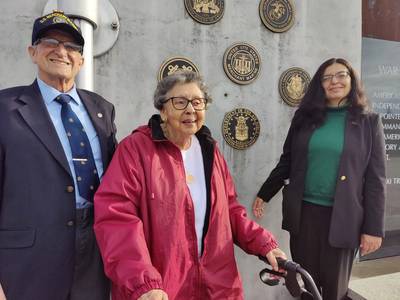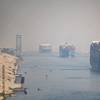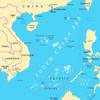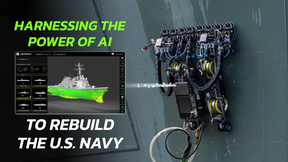Remembering the service, sacrifice of the Merchant Marine
It was my pleasure on Nov. 10 to participate in the dedication of the U.S. Merchant Marine emblem alongside the emblems of the Armed Services of the United States at Veterans Memorial Plaza in Anacortes.
I can’t think of a more auspicious time to have made this dedication than on Veteran’s Day weekend.
We are a maritime nation.
For those of you who don’t know, the U.S. Maritime Administration – MARAD for short -- is an agency within the U.S. Department of Transportation. Our mission is promoting waterborne transportation. We support marine shipping and its integration within transportation systems, and the viability of the U.S. Merchant Marine.
MARAD works to support ships and shipping, shipbuilding, port operations, vessel operations and national security.
MARAD is also charged with maintaining the health of the Merchant Marine, since commercial mariners, vessels and intermodal facilities are vital for supporting national security and the vital role the maritime industry plays in the lives of all Americans.
The success of our economies is driven and reflected in the success of our ports. Our ports connect the nation and the world. To put this in perspective, 80-90% of all goods in the U.S. come from ships operated by the Merchant Marine.
The Merchant Marine allows Americans our incredible standard of living by their work to support domestic and international trade -- from the clothes we wear to the food we eat, the electronic devices we depend on, and the cars many of us drove here today.
I’m going to take us back to World War II when the role of the Merchant Marine was critical to our war efforts. General Eisenhower said it best, “When final victory is ours, there is no organization that will share its credit more deservedly than the Merchant Marine."
Throughout our nation's history, the loyalty, courage and fortitude of the officers and men of the Merchant Marine played a critical role in our victory in many conflicts, none more noteworthy than World War II.
Merchant mariners risked their lives to assist the military during World War II, transporting nearly 75% of our personnel into war zones. They also carried about 90% of the food, mail, ammunition and other supplies the armed services used.
Some 243,000 mariners served in the war. Of those, 9,521 perished while serving — a higher proportion of those killed than any other branch of the U.S. military -- and 609 mariners were captured by the Japanese and held as prisoners of war.
Six ships manned by the Merchant Marine were sunk by the Germans and Japanese before the attack on Pearl Harbor in 1941, making mariners some of the first American casualties of the growing global conflict.
Mariners risked their lives supplying the various branches of the armed forces and joint operations with the tools needed to win the war. But their behind-the-scenes logistical work and public misunderstanding over their service status meant they often were not recognized for their work and sacrifice.
It is fitting and proper that we remember the service and sacrifice of the Merchant Marine.
Washingtonians are particularly fortunate to live in a state served by a ferry system operated by credentialed merchant mariners. Our ferries make it possible for us to get to medical appointments, take vacations, commute to work and participate in other aspects of life. Next time you ride the ferry, take a moment to thank these essential workers for their service.
Further, Washington’s economy is highly dependent on trade. Maritime trade supports 174,300 Washington jobs and generates $46 billion in revenue.
I highly encourage young people to consider a career in the maritime industry.
I salute all mariners for their service to our communities, our state and our nation. Thank you.
Xochitl Castañeda is Pacific Northwest and Alaska Gateway director of the U.S. Maritime Administration. She lives in Edmonds.
















